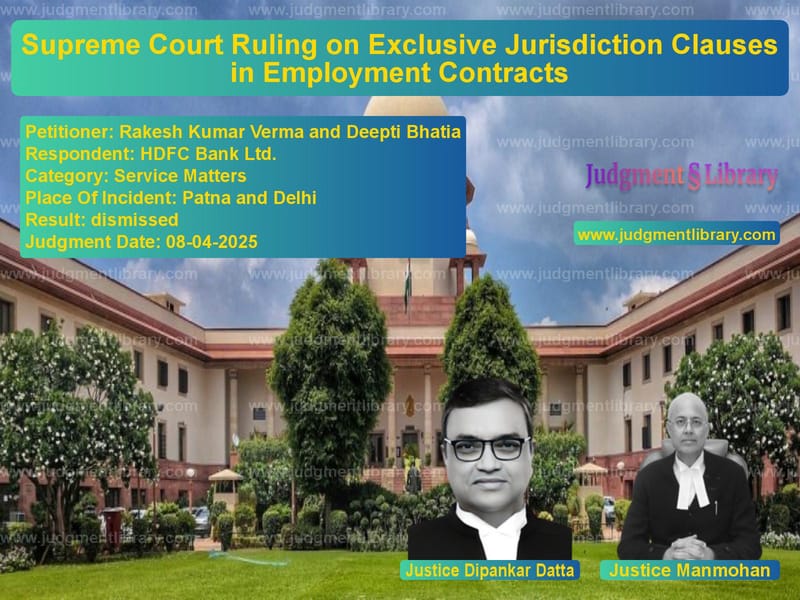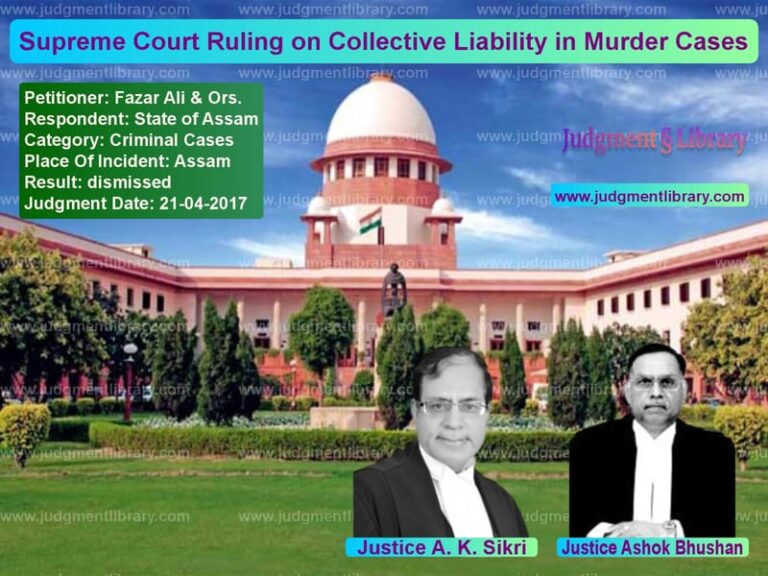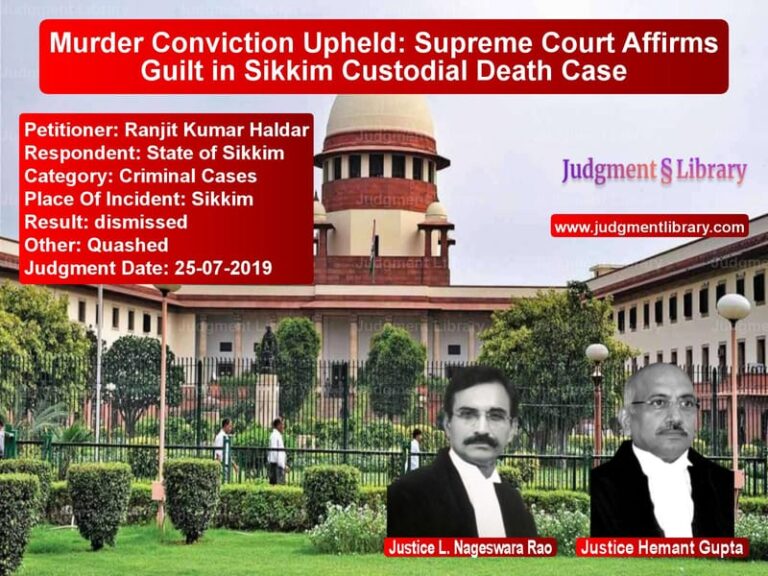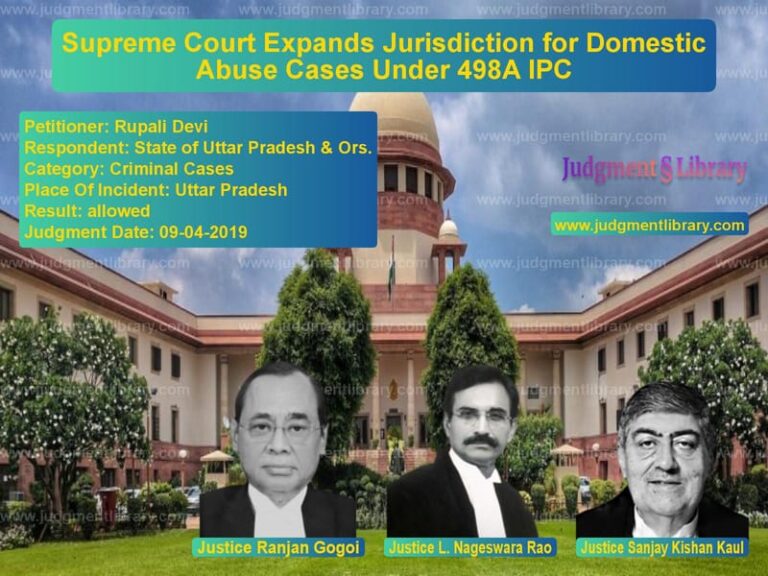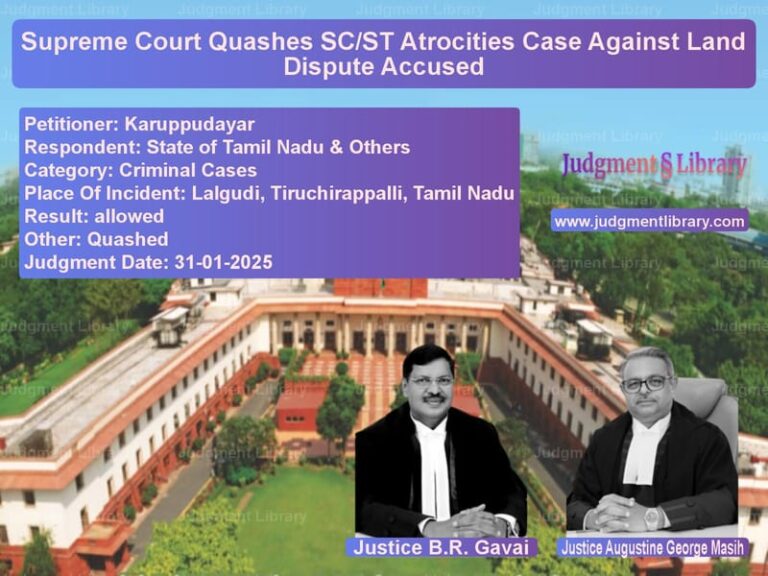Supreme Court Ruling on Exclusive Jurisdiction Clauses in Employment Contracts
The Supreme Court of India recently delivered a significant judgment addressing the validity of exclusive jurisdiction clauses in employment contracts. The case involved two appeals: one filed by Rakesh Kumar Verma against HDFC Bank Ltd., and another by HDFC Bank against Deepti Bhatia. The core issue revolved around whether civil suits filed by employees in Patna and Delhi could proceed despite contractual clauses specifying Mumbai courts as the exclusive forum for dispute resolution.
Background of the Case
The lead appeal (Civil Appeal No. 2282/2025) was filed by Rakesh Kumar Verma, challenging the Patna High Court’s decision to allow HDFC Bank’s civil revisional application. The High Court had ruled that the courts in Patna lacked jurisdiction due to an exclusive jurisdiction clause in Rakesh’s appointment letter, which designated Mumbai courts as the sole forum for disputes.
The connected appeal (Civil Appeal No. 2286/2025) was filed by HDFC Bank against the Delhi High Court’s dismissal of its civil revisional application. The Delhi High Court had held that the exclusive jurisdiction clause did not oust the jurisdiction of Delhi courts, as Deepti Bhatia was employed and terminated in Delhi.
Key Arguments
Arguments by the Petitioners (Rakesh Kumar Verma and Deepti Bhatia)
- Rakesh Kumar Verma: Contended that the termination of his service was illegal and arbitrary. He argued that the exclusive jurisdiction clause should not bind him to Mumbai courts, as the cause of action (termination) arose in Patna.
- Deepti Bhatia: Similarly, argued that her termination was unlawful and that the Delhi courts had jurisdiction since she was employed and terminated in Delhi. Her counsel relied on the Delhi High Court’s decision in Vishal Gupta v. L & T Finance, which held that exclusive jurisdiction clauses in employment contracts do not oust the jurisdiction of courts where the employee resides or works.
Arguments by the Respondent (HDFC Bank)
- HDFC Bank maintained that the exclusive jurisdiction clause in the employment contracts was valid and enforceable. The bank argued that the clauses were clear and unambiguous, and the parties had mutually agreed to resolve disputes only in Mumbai courts.
- The bank cited several Supreme Court precedents, including Swastik Gases (P) Ltd. v. Indian Oil Corpn. Ltd. and ABC Laminart Pvt. Ltd. v. A.P. Agencies, Salem, to support its position that such clauses are legally binding unless they violate statutory provisions.
Supreme Court’s Analysis
The Supreme Court, in its judgment authored by Justice Dipankar Datta and Justice Manmohan, meticulously analyzed the legal principles governing exclusive jurisdiction clauses. The Court emphasized the following key points:
1. Legal Framework
The Court referred to Section 28 of the Indian Contract Act, 1872, which voids agreements that absolutely restrict parties from enforcing their rights through legal proceedings. However, the Court clarified that exclusive jurisdiction clauses do not fall under this prohibition, as they merely designate a specific forum for dispute resolution without extinguishing legal rights.
The Court also examined Section 20 of the Code of Civil Procedure, 1908 (CPC), which governs the jurisdiction of courts in civil suits. The explanation to Section 20 states that a corporation is deemed to carry on business at its principal office or subordinate offices. The Court held that since HDFC Bank’s principal office is in Mumbai and the decisions to terminate the employees were made there, Mumbai courts had jurisdiction.
2. Precedents
The Court relied on several landmark judgments to reinforce its reasoning:
- Hakam Singh v. Gammon (India) Ltd. (1971): Held that parties cannot confer jurisdiction on a court that lacks it under the CPC, but they can agree to resolve disputes in one of multiple competent courts.
- ABC Laminart Pvt. Ltd. v. A.P. Agencies, Salem (1989): Clarified that when a contract specifies jurisdiction for a particular court, the intention to exclude other courts can be inferred, especially if terms like ‘exclusive’ are used.
- Swastik Gases (P) Ltd. v. Indian Oil Corpn. Ltd. (2013): A three-judge Bench ruled that the absence of words like ‘alone’ or ‘only’ in a jurisdiction clause does not negate its exclusivity if the parties’ intent is clear.
3. Employment Contracts vs. Other Contracts
The petitioners argued that employment contracts should be treated differently due to the unequal bargaining power between employers and employees. They likened the relationship to a ‘mighty lion and a timid rabbit.’ However, the Court rejected this analogy, stating:
“Law treats all contracts with equal respect and unless a contract is proved to suffer from any of the vitiating factors, the terms and conditions have to be enforced regardless of the relative strengths and weakness of the parties.”
The Court emphasized that unequal bargaining power is not unique to employment contracts and exists in various commercial relationships. It held that the principles governing exclusive jurisdiction clauses apply uniformly across all types of contracts, including employment agreements.
Court’s Decision
The Supreme Court upheld the Patna High Court’s decision, ruling that the exclusive jurisdiction clause in Rakesh’s appointment letter was valid and enforceable. However, the Court noted that the High Court erred in rejecting the plaint under Order VII, Rule 11 of the CPC. Instead, it directed the trial court to return the plaint to Rakesh under Order VII, Rule 10, allowing him to present it before the competent court in Mumbai.
In the connected appeal, the Court set aside the Delhi High Court’s judgment and ruled in favor of HDFC Bank, holding that Deepti’s suit should also be filed in Mumbai. The Court granted both employees liberty to amend their plaints or file fresh suits in Mumbai, ensuring their claims were not barred by limitation.
Conclusion
The Supreme Court’s judgment reaffirms the enforceability of exclusive jurisdiction clauses in employment contracts, provided they meet the three mandatory criteria:
- They do not violate Section 28 of the Contract Act.
- The designated court has jurisdiction under the CPC.
- The clause explicitly or implicitly confers exclusivity.
The ruling provides clarity for employers and employees alike, emphasizing that contractual terms agreed upon at the outset will generally be upheld, regardless of the parties’ relative bargaining power.
Petitioner Name: Rakesh Kumar Verma and Deepti Bhatia.Respondent Name: HDFC Bank Ltd..Judgment By: Justice Dipankar Datta, Justice Manmohan.Place Of Incident: Patna and Delhi.Judgment Date: 08-04-2025.Result: dismissed.
Don’t miss out on the full details! Download the complete judgment in PDF format below and gain valuable insights instantly!
Download Judgment: rakesh-kumar-verma-a-vs-hdfc-bank-ltd.-supreme-court-of-india-judgment-dated-08-04-2025.pdf
Directly Download Judgment: Directly download this Judgment
See all petitions in Employment Disputes
See all petitions in Contractual Employment
See all petitions in Termination Cases
See all petitions in Workplace Harassment
See all petitions in Judgment by Dipankar Datta
See all petitions in Judgment by Manmohan
See all petitions in dismissed
See all petitions in supreme court of India judgments April 2025
See all petitions in 2025 judgments
See all posts in Service Matters Category
See all allowed petitions in Service Matters Category
See all Dismissed petitions in Service Matters Category
See all partially allowed petitions in Service Matters Category

